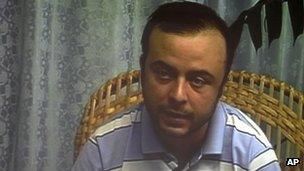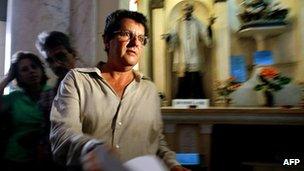Oswaldo Paya death: Spanish politician in jail in Cuba
- Published

Angel Carromero could be charged and sentenced to up to 10 years in jail
Cuba has decided that Spanish politician Angel Carromero should stay in custody over the death of well-known dissident Oswaldo Paya in a car crash.
Mr Carromero was driving a rental car that crashed against a tree as it hit an unpaved stretch of road in eastern Cuba on 22 July.
A preliminary investigation blamed the driver for the crash.
A Cuban prosecutor has up to six months to decide whether to press charges against Mr Carromero.
An article published in the official newspaper, Granma, says he "has been accused of the charge of homicide while driving a vehicle on public roads".
Mr Carromero and Swedish politician Jens Aron Modig survived the crash that claimed the lives of Mr Paya and 30-year-old Cuban human rights campaigner Harold Cepero.
Mr Paya's family rejected the official findings and suggested that the car might have been pushed off the road.
But on Monday Mr Carromero appeared in a pre-recorded video released by the Cuban authorities admitting that he had lost control of the car and denying that a second vehicle had been involved in the crash.
In the video, he also asked the international community to focus on getting him out of Cuba and he made a pledge for the accident not to be used "for political ends".
Mr Modig appeared in a media conference in Havana and said he had no memory of a second car hitting them.

Oswaldo Paya, a Roman Catholic, was the founder of the Christian Liberation Movement
Breaking the law
Mr Modig, a member of Sweden's Christian Democratic Party, and Angel Carromero, from Spain's centre-right Popular Party, admitted that they had taken some 4,000 euros ($4,900; £3,100) for Oswaldo Paya and other dissidents, which is illegal in Cuba.
They were driving Mr Paya and Mr Cepero to meet other dissidents when their rental car crashed in eastern Granma province.
After apologising for breaking the law, Mr Modig was released and has now returned to Sweden.
Oswaldo Paya, who was 60, was best known as the founder of the Varela project, a campaign begun in 1998 to gather signatures in support of a referendum on laws guaranteeing civil rights.
In May 2002, he presented Cuba's National Assembly with a petition of more than 10,000 signatures calling for an end to four decades of one-party rule.
The Cuban government described Mr Paya as an agent of the US who was working to undermine the country's revolution.
But the anti-Castro opposition in the US criticised him for being too moderate.
- Published27 July 2012
- Published25 July 2012
- Published25 July 2012
- Published24 July 2012